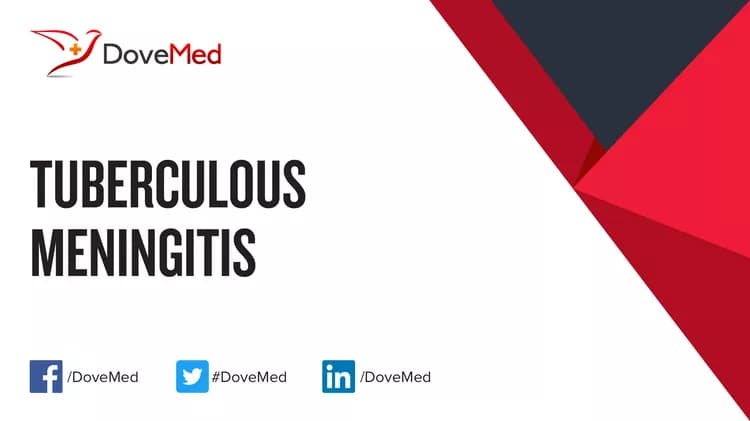What are the other Names for this Condition? (Also known as/Synonyms)
- TB Meningitis
- Tubercular Meningitis
What is Tuberculous Meningitis? (Definition/Background Information)
- Meningitis is inflammation of the membrane covering the brain and spinal cord, and often caused by infections. When meningitis is caused by Mycobacterium tuberculosis, the bacterium that causes tuberculosis, it is called Tuberculous Meningitis
- Typically, Tuberculous Meningitis occurs secondary to Mycobacterium tuberculosis infection in another part of the body, such as the lungs
- The condition can affect males and females of all ages and ethnicities. However, those with a compromised immune system may be at a higher risk for Tuberculous Meningitis
- Antibiotics and corticosteroids may be used to combat Tuberculous Meningitis. Without treatment, the condition may lead to fatalities
Who gets Tuberculous Meningitis? (Age and Sex Distribution)
- Tuberculous Meningitis is the most common type of tuberculosis of the central nervous system
- The prevalence of Tuberculous Meningitis is determined by the overall prevalence of tuberculosis in a said population
- Both males and females may be affected
- Worldwide, individuals of all racial and ethnic groups may be affected
What are the Risk Factors for Tuberculous Meningitis? (Predisposing Factors)
Some known risk factors for Tuberculous Meningitis may include:
- Being infected with HIV, AIDS
- Having compromised immunity due to:
- Cancer treatments
- Immunosuppressant drugs used following organ or tissue transplantation
- Having tuberculosis elsewhere in the body
It is important to note that having a risk factor does not mean that one will get the condition. A risk factor increases one’s chances of getting a condition compared to an individual without the risk factors. Some risk factors are more important than others.
Also, not having a risk factor does not mean that an individual will not get the condition. It is always important to discuss the effect of risk factors with your healthcare provider.
What are the Causes of Tuberculous Meningitis? (Etiology)
- Meningitis is inflammation of the membrane covering the brain and spinal cord, and often caused by infections. When meningitis is caused by Mycobacterium tuberculosis, (the bacterium that causes tuberculosis), it is called Tuberculous Meningitis
- Typically, Tuberculous Meningitis occurs secondary to Mycobacterium tuberculosis infection in another part of the body, such as the lungs
What are the Signs and Symptoms of Tuberculous Meningitis?
The signs and symptoms of Tuberculous Meningitis may include the following:
- High fever, headache, and stiff neck
- Nausea, vomiting, and sensitivity to light
- Confusion and lethargy
- Seizure
- Skin rash that spreads over the trunk, legs and feet, palms and soles
In children, the following additional signs and symptoms may be present:
- Poor feeding
- Irritability
- Agitation
- Bulging of the soft spot in the skull of babies
- Head/neck arched backwards (infants)
How is Tuberculous Meningitis Diagnosed?
Tuberculous Meningitis is diagnosed on the basis of the following information:
- A thorough evaluation of medical history with a complete physical exam
- An assessment of signs and symptoms
- Examination of cerebral spinal fluid (CSF) obtained by a spinal tap (lumbar puncture) procedure
- Typically, CSF will have elevated levels of white blood cells (leukocytes) and protein, and decreased levels of glucose
- Bacteria may be identified in the CSF, through culture methods or serological tests
- These tests may help detect the particular type of bacteria so that the proper antibiotics may be administered
- Blood test before a lumbar puncture - this may be done, so that empirical antibiotics (initial treatment) can be started
- If necessary, MRI or CT scan, especially those with impaired consciousness, to determine if it would be safe to perform a lumbar puncture procedure
Many clinical conditions may have similar signs and symptoms. Your healthcare provider may perform additional tests to rule out other clinical conditions to arrive at a definitive diagnosis.
What are the possible Complications of Tuberculous Meningitis?
The complications of Tuberculous Meningitis may include:
- Deafness (may be an immediate or delayed complication
- Paralysis of limbs or eye movements
- Visual impairment
- Depression, fatigue, and sleep disorders
- Memory impairment
- Epilepsy
- Hydrocephalus
- Stroke and coma
Complications may occur with or without treatment, and in some cases, due to treatment also.
How is Tuberculous Meningitis Treated?
The treatment for Tuberculous Meningitis may include:
- A cocktail of antibiotics - prescribed for the duration of at least 12 months
- A 2-month initial course with rifampicin, isoniazid, pyrazinamide and ethambutol, followed by
- A 10-month course of rifampicin, isoniazid
- The treatment may be initiated by a healthcare provider before confirmatory test results are procured
- Corticosteroids may be necessary with the antibiotics
How can Tuberculous Meningitis be Prevented?
Tuberculous Meningitis may be prevented by:
- Seeking medical attention for pre-existing medical conditions that may make an individual vulnerable to Tuberculous Meningitis
- Seeking medical attention for an inactive tuberculosis infection
- Vaccinating against the disease in areas where tuberculosis is prevalent; this may help young children from getting Tuberculous Meningitis
- Completing the course of medicines as prescribed by the healthcare provider, even if one feels better. This will avoid the emergence of drug-resistant bacterial variants
- Long-term follow-ups, with regular medical screening at periodic intervals (with tests and physical examinations) to check for/prevent recurrent Tuberculous Meningitis
What is the Prognosis of Tuberculous Meningitis? (Outcomes/Resolutions)
- The prognosis of Tuberculous Meningitis is guarded, since this severe form of Mycobacterium tuberculosis infection can cause disability or death in over 50% of those affected. Without treatment, the outcome is poor
- Even with treatment, many of those affected may have permanent brain damage
Additional and Relevant Useful Information for Tuberculous Meningitis:
The following DoveMed website link is a useful resource for additional information:
Related Articles
Test Your Knowledge
Asked by users
Related Centers
Related Specialties
Related Physicians
Related Procedures
Related Resources
Join DoveHubs
and connect with fellow professionals


0 Comments
Please log in to post a comment.